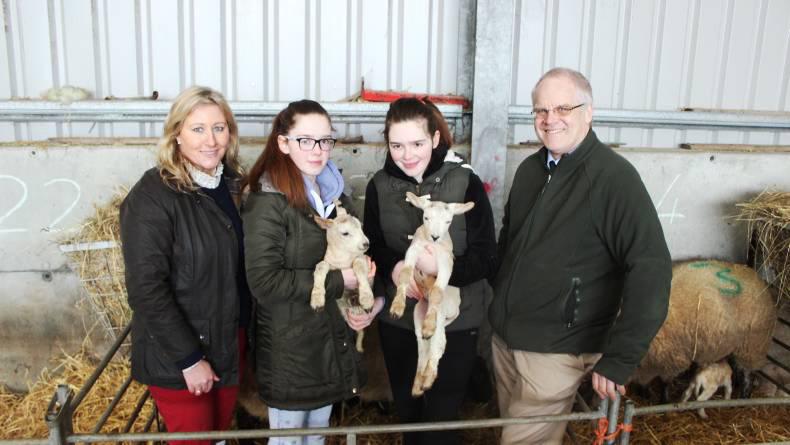It’s been 40 years since the ag science syllabus currently in use was introduced. Now we’re one step closer to rectifying this, as the draft specification for the new agricultural science course for the Leaving Cert is open for public consultation.
Those who are interested can access the draft specification right now on the National Council for Curriculum and Assessment (NCCA) website until the end of March, and there’s a questionnaire available there which provides an opportunity to give feedback.
Information from the public consultation will be taken back to the NCCA ag science development group, and the specification will be amended based on the comments.
This is all great news, as the current syllabus is not representative of modern farming practices and, as it currently stands, is just five pages long – compared with, for example, the 52-page biology syllabus.
There are many key areas missing from the 40-year-old syllabus. There is a complete lack of any European or Irish agricultural policy on the course.
Little or no technology makes it onto the paper. New animal production systems are also not accounted for on the current syllabus, while current grazing techniques and new grass varieties aren’t present either.
Crops such as maize and wholecrop wheat aren’t on the current syllabus, while animal welfare and sustainability don’t play a key role either.
To give a rough outline of the new draft specification, it has four main strands: scientific practices, soils, grass and other crops, and animals. It also has seven cross-cutting themes, which are addressed through the four strands: health and safety, microbiology, environmental sustainability, food production, nutrition, policy and economics, and breeding and genetics.
It is planned the specification will be approved by the NCCA council in autumn 2016 prior to entering a formal process where the document will be signed off by the Department of Education, for possible delivery in schools by September 2017.
The role of Agri Aware
Agri Aware is an independent farming and agri-food educational body which is supported by over 70 patrons from across the Irish agri-food industry and Agri Aware’s chief executive, Dr Vanessa Woods and former Agri Aware chair, Bernard Donohue, initiated this process.
Vanessa Woods holds the position of project officer with the NCCA development group to deliver this specification, while Bernard Donohue holds a seat in this group, representing IBEC.
Agri Aware then under Vanessa and Bernard’s stewardship engaged the leaders of the Irish agri-food industry to ensure the specification was industry relevant for now and into the future.
Agri Aware held a meeting with its patrons in Buswells Hotels in December 2014 and at this meeting the content of the new agricultural science specification was discussed and key areas that should be included were agreed upon, based on industry leaders’ suggestions.
This current specification draws on feedback Agri Aware received at that event and on feedback from NCCA focus group meetings. “We are now looking for feedback on what we produced based on their suggestions,” says Vanessa Woods.
Current Agri Aware chair Richard Moeran said, “Industry has had an opportunity to have an input into that new specification, and as far as I’m aware no other exam that is taken for the leaving certificate will have had input from industry.
“In other words, industry is able to say ‘It’s important that these are in the exam, that this is focused on’ and ‘We don’t need that anymore, because it is not relevant in today’s world.’”
Bill Lynch, a former director, curriculum and assessment, in the NCCA says, “The development of this specification presents a major opportunity to introduce an up-to-date agricultural science course that reflects modern practice in both science and agriculture.”
Richard concludes, “It’s been a difficult, long process to get this far, but we’re at the point now where we’ll be able to deliver a new ag science syllabus, it’s very exciting.”
Focus groups
There will also be NCCA focus group meetings with the Irish Agricultural Science Teachers Association (IASTA) on the new specification.
IASTA held their annual conference in The Abbey Hotel in Roscommon recently and honorary president of IASTA 2016, Mairead Lavery made a special address at the annual dinner.
The IASTA conference spent much of Saturday discussing the NCCA new draft specification. The team leaders and members of the executive scrutinised and completed an analysis of the developments and outcomes of the morning session.
Announcement
The announcement of the new draft ag science specification took place at the launch of Agri Aware’s Farm Walk and Talk 2016 at Teagasc Grange research centre last week on a beautiful, crisp, blue-skied day.
This event sees a total of 2,500 ag science students from 80 schools across the country visit active farms and eight different centres of excellence, such as Teagasc Grange to gain a practical insight into Irish agriculture for their leaving cert studies.
Students engage in applied learning on working farms and hear talks from leading experts from across the Irish agri-food industry.
Throughout the week-long event, representatives from ABP, Dawn Meats, Kepak and Liffey Meats provide educational talks and presentations on the meat industry.
Dairy industry experts are on hand also, from Glanbia, Dairygold, Dairymaster, Lakeland Dairies, Aurivo, LacPatrick Co-op and Arrabawn.
Gouldings and Grassland Agro are also there, representing the fertiliser industry.
Richard Moeran noted these interactive days on farms “give the students a unique opportunity to be able to engage directly with people who could be your employers down the road”.
“I always say the future captains of industry might be here today, and if that spark is ignited by a conversation or something you might see here today, that’s really what this is all about,” said Moeran.
“You’ve done a lot of academics, you’ve seen the classroom side of agricultural science and today you’ll get an opportunity be able to see how it actually works.”






 This is a subscriber-only article
This is a subscriber-only article





SHARING OPTIONS: